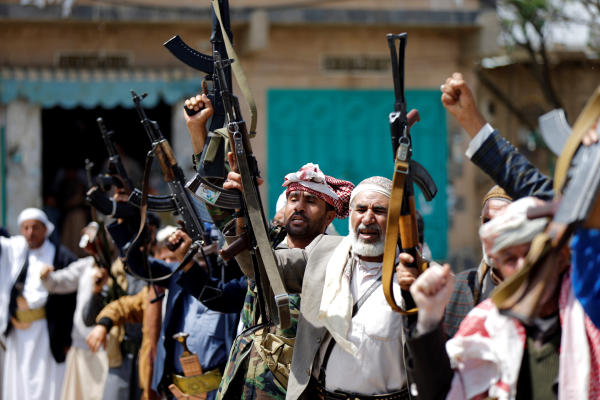I do not know why Yemen’s legitimate government is angered by the declaration that a presidential council formed of its opponents has been set up as the council remains illegitimate due to the fact that it is composed of two rebel groups.
On the 21st of September 2014, Houthi militias occupied the capital Sana’a through deceit and used the excuse of anti-government protests to fill the squares with their men. They also agreed with the ousted president Saleh to plan a coup against the government which was formed on the basis of a UN Security Council decision and that had been recognised by Saleh and the Houthis.
The militias took control of the headquarters of the Council of Ministers, the Ministry of Defence and state radio and television. They also surrounded President Hadi’s presidential palace and placed him under house arrest.
If the rebels were satisfied with controlling Sana’a and the northern provinces, their conspiracy might have succeeded and the different powers would have been forced to accept the new reality. Everyone would have accepted political changes later, and it is likely that conflict would have broken out between the rebels themselves, especially as Saleh had waged war against the Houthis between 2004 and 2010.
President Hadi managed to escape from the presidential palace to the city of Aden. If the rebels accepted what had happened, an alternative solution that involved the division of the country so that Saleh and the Houthis would control north Yemen and Hadi would control the south could be declared.
The acceptance of the new reality, i.e. the coup, would automatically revive the system of two Yemeni republics. The People’s Democratic Republic of Yemen and its capital Aden collapsed in 1990 after the collapse of its ally, the Soviet Union. Its then President Ali Salem Al-Beidh decided to go to Sana’a and hand over power to his opponent Ali Abdullah Saleh in a distorted unity plan. Saleh annexed the south, expanded his republic and managed it in the same way that he had managed North Yemen.
The strategic error, or it may have been a deliberate plan, was that the rebels were not content with taking over Sana’a and rushed to occupy southern Yemen. They besieged the capital of Aden, destroyed large districts of it and committed brutal massacres. The president and his government left and took refuge in Riyadh and they began a new chapter from there.
Saudi Arabia realised that the occupation of Aden and the rest of the south meant full control of a large country like Yemen, and that it would be used as a launching pad to target the kingdom for the benefit of foreign countries, particularly Iran which continues to threaten Saudi Arabia by opening fronts against it in response to what is happening in Syria against Bashar Al-Assad. This is what is happening in Yemen today, and it is incorrect to say that the failure of a solution in Yemen is a result of the inability of factions to agree. The Iranians invented Houthi militia for one purpose – to threaten Saudi Arabia.
Now, Saudi backed Yemeni forces are surrounding the capital Sana’a and are fighting in many areas. The rebels are trying to expand southwards toward the Strait of Bab El-Mandeb, a strategic decision because of its location on the Red Sea, in order to control it, threaten navigation and smuggle weapons by breaking the naval blockade imposed by a Security Council resolution.
Shipments of advanced weapons on their way from Iran to the rebels were seized a few days ago. Since the war began, the rebels have lost control of the airport as the coalition only allows aircraft carrying aid to pass. In addition to this, the coalition has besieged many ports. This does not prevent supplies from reaching the rebels through smuggling, but it remains a difficult task.
Options in Yemen today are limited as long as the Houthis and Saleh want power and not only political participation. This violates Security Council resolutions, is against the desire of the Yemeni people who revolted against Saleh in 2011 and invalidates the pledge that the rebels signed. In addition to this, they have transformed into groups that work in favour of Iran against Saudi Arabia. Confronting them is the only option if all of these factors are considered.
